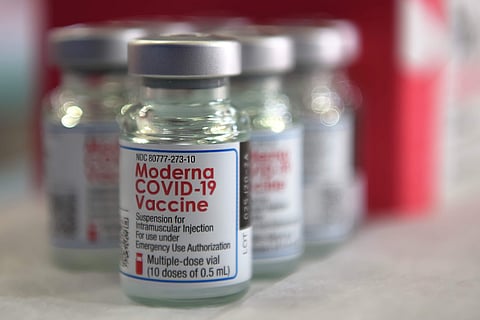

Moderna's mRNA COVID vaccine and a protein-based shot is safe for use in young children and offers strong immunity response, with no adverse effects, according to a research on baby rhesus macaques.
The study by a team of scientists at the University of North Carolina (UNC) at Chapel Hill, Weill Cornell Medicine and NewYork-Presbyterian reported that both the vaccines elicited strong neutralising antibody responses to SARS-CoV-2, the virus causing COVID-19, in 16 baby rhesus macaques. The antibody responses persisted for 22 weeks.
The research, published in the journal Science Immunology, suggests that vaccines for young children are likely important, safe tools to curtail the pandemic.
"The level of potent antibodies we observed were comparable to what has been seen in adult macaques, even though the doses were 30 micrograms instead of the 100 microgram adult doses," said Kristina De Paris, PhD, professor of microbiology and immunology at the UNC School of Medicine.
"With the Moderna vaccine, we observed specific strong T cell responses, as well, which we know are important to limiting disease severity," De Paris added.
To evaluate SARS-CoV-2 infant vaccination, the researchers immunised two groups of 8 infant rhesus macaques at 2.2 months of age and 4 weeks later.
Each animal received one of two vaccine types: a preclinical version of the Moderna mRNA vaccine or a protein-based vaccine developed by the Vaccine Research Center of the National Institute of Allergy and Infectious Diseases (NIAID), part of the National Institutes of Health, with an adjuvant from 3M that stimulates cells through toll-like receptor 7 and 8.
Both vaccines elicited high magnitude of IgG neutralising antibodies against SARS-CoV-2 and Spike protein-specific T cell responses -IL-17, IFN-g, and TNF. These are called T helper 1 immune responses.
Importantly, the vaccines did not elicit T helper type 2 responses, which can be detrimental to vaccine efficacy and safety in infants. Such responses can counter the immune response against the virus. And so, T helper 2 responses have hindered the development of vaccines in young children, most notably for the common Respiratory Syncytial Virus (RSV).
